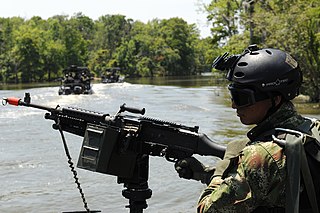Related Research Articles

Colombia, officially the Republic of Colombia, is a country in South America with territories in North America. Colombia is bounded on the north by the Caribbean Sea, the northwest by Panama, the south by Ecuador and Peru, the east by Venezuela, the southeast by Brazil, and the west by the Pacific Ocean. It comprises 32 departments and the Capital District of Bogotá, the country's largest city.

César Augusto Gaviria Trujillo is a Colombian economist and politician who served as the President of Colombia from 1990 to 1994, Secretary General of the Organization of American States from 1994 to 2004 and National Director of the Colombian Liberal Party from 2005 to 2009. During his tenure as president, he summoned the Constituent Assembly of Colombia that enacted the Constitution of 1991.

Plan Colombia was a United States foreign aid, military aid, and diplomatic initiative aimed at combating Colombian drug cartels and left-wing insurgent groups in Colombia. The plan was originally conceived in 1999 by the administrations of Colombian President Andrés Pastrana and U.S. President Bill Clinton, and signed into law by the United States in 2000.

Malpelo is a small island in the eastern Pacific Ocean, located about 500 km (310 mi) west of the Colombian mainland with a military post manned by the Colombian Armed Forces. It consists of a sheer and barren rock with three high peaks, the highest being Cerro de la Mona with a height of 300 m (980 ft). The island is about 1.5 kilometres in length from northeast to southwest, and 640 metres in width.

The Colombian conflict began on May 27, 1964, and is a low-intensity asymmetric war between the government of Colombia, far-right paramilitary groups, crime syndicates and far-left guerrilla groups such as the Revolutionary Armed Forces of Colombia (FARC), the National Liberation Army (ELN) and the Popular Liberation Army (EPL), fighting each other to increase their influence in Colombian territory. Some of the most important international contributors to the Colombian conflict include multinational corporations, the United States, Cuba and the drug trafficking industry.

The Bolivarian Games are a regional multi-sport event held in honor of Simón Bolívar, and organized by the Bolivarian Sports Organization. The event is open to athletes from Bolivia, Colombia, Ecuador, Panama, Peru, and Venezuela. In 2010, the ODEBO decided to include Chile as seventh member of ODEBO. Except Panama, all other participating countries are Andean states.

The athletics competition at the 2006 Central American and Caribbean Games took place at the Estadio Pedro de Heredia in Cartagena, Colombia and lasted from July 25 to July 29. There were 23 events for men and 21 for women. A total of ten Games records were broken at the competition, in addition to a number of national records.
Fundación ProAves is a nonprofit environmental organization in Colombia established in 1998. Its primary aims are to protects birds of conservation concern and their habitats across Colombia.
The Colombia national under-20 football team represents Colombia in international under-20 football competitions and is overseen by the Colombian Football Federation.
Colombians in the United Kingdom include British citizens or residents who are of Colombian ancestry. According to the 2011 UK Census, the Colombian-born population of England was 25,016, Wales 166, Scotland 507 and Northern Ireland 72.
The Military ranks of the Colombian armed forces consist of the list and ordering of the different military ranks, for the Officers, Non-commissioned officers (NCOs) and soldiers, seamen and airmen of the Military Forces of Colombia. The ranks are visually represented by insignias placed on the uniforms, usually at the shoulders, sleeves and shirt collars.

Colombian nationality is typically obtained by birth in Colombia when one of the parents is either a Colombian citizen or a Colombian legal resident, by birth abroad when at least one parent was born in Colombia, or by naturalization, as defined by Article 96 of the Constitution of Colombia and the Law 43-1993 as modified by Legislative Act 1 of 2002.
Lebanese Colombians are Colombians of Lebanese descent. Most of the Lebanese community's forebears immigrated to Colombia from the Ottoman Empire in the late 19th and early 20th centuries for economic, political and religious reasons. When they were first processed in the ports of Colombia, they were classified as Turks because what is modern day Lebanon was a territory of the Turkish Ottoman Empire. The first Lebanese moved to Colombia in the late nineteenth century. There was another wave in the early twentieth century. It is estimated that over 10,000 Lebanese immigrated to Colombia from 1900 to 1930.
Colombia, in common with many Latin American nations, evolved as a highly segregated society. The Colombian Conflict began in the mid-1960s and is a low-intensity asymmetric war between Colombian governments, paramilitary groups, crime syndicates, and left-wing guerrillas such as the Revolutionary Armed Forces of Colombia (FARC), and the National Liberation Army (ELN), fighting each other to increase their influence in Colombian territory. Two of the most important international actors that have contributed to the Colombian conflict are multinational companies and the United States.

The 48th South American Championships in Athletics were held at the Parque de Atletismo Campo Elías Gutiérrez in Cartagena, Colombia, between July 5-7, 2013.

Cadena's tailless bat is a species of bat native to Colombia. In 2006 it was described as a separate species from the tailed tailless bat species complex.

The 2018 Colombian Census was the 18th population census in Colombia, and the 7th to include the counting of households and dwelling units. It was developed by the National Administrative Department of Statistics (DANE) of the Republic of Colombia, whose guidelines and rules were established by Decree 1899 of November 22, 2017.
References
- ↑ Dimitri Forero (2006). "New records of Reduviidae (Hemiptera: Heteroptera) from Colombia and other Neotropical countries" (PDF). Zootaxa 1107: 1–47 (2006). Archived from the original (PDF) on 2014-03-28.
| | This Heteroptera article is a stub. You can help Wikipedia by expanding it. |